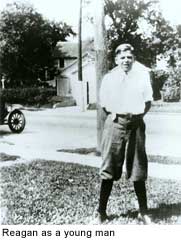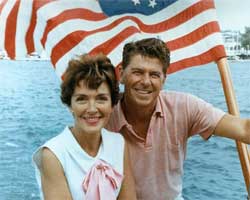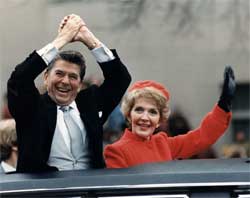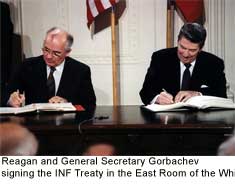Ronald Wilson Reagan, the fortieth United States President (1981-1989) was the oldest man to serve as Chief Executive. He was sixty-nine years old at the time of his election. The first movie actor to be elected President, he became known as "The Great Communicator" for his oratory skills.

 He was born on February 6, 1911, in Tampico, Illinois, He was born on February 6, 1911, in Tampico, Illinois,
to working class parents who did not have much money. His father went bankrupt during the Great Depression. Reagan worked his way through Eureka College,
earning his BA in 1932. He got a job in radio and then tried acting. Ronald Reagan made over fifty movies.
One of his more famous roles was in a movie called "Knute Rockne, All American," where Reagan played a Notre Dame football player. A line from that movie, "lets win this one for the gipper," was forever connected with him. Reagan was also the spokesperson for the General Electric Show. Reagan also became president of the Screen Actors Guild, serving five consecutive terms.
 Reagan took a sabbatical from acting to serve in the Army during World War II. He had married actress Jane Wyman in 1940 and they had two children, Michael and Maureen. They divorced in 1948, and in 1952 Reagan married Nancy Davis, another actress and the woman he calls the love of his life. They also had two children, Patti and Ronald, Jr. Reagan took a sabbatical from acting to serve in the Army during World War II. He had married actress Jane Wyman in 1940 and they had two children, Michael and Maureen. They divorced in 1948, and in 1952 Reagan married Nancy Davis, another actress and the woman he calls the love of his life. They also had two children, Patti and Ronald, Jr.
 Reagan's foundation was rooted in the democratic views that his father had taught him growing up during the years of "New Deal," but later he went on to speak out against big government and Communism. By the 1960s he had become a well-known spokesperson for conservative positions. At the Republican Convention in 1964 he spoke passionately for Barry Goldwater, who he considered the father of Conservatism. Reagan traveled throughout the country in support of the Goldwater campaign, making important friends, who in later years would become known as his "Kitchen Kabinet." Reagan's foundation was rooted in the democratic views that his father had taught him growing up during the years of "New Deal," but later he went on to speak out against big government and Communism. By the 1960s he had become a well-known spokesperson for conservative positions. At the Republican Convention in 1964 he spoke passionately for Barry Goldwater, who he considered the father of Conservatism. Reagan traveled throughout the country in support of the Goldwater campaign, making important friends, who in later years would become known as his "Kitchen Kabinet."
His first political challenge was to take on the popular Governor of California (Pat Brown) in 1966, and with a campaign focus of "let the people control their destiny", he easily won and subsequently went on to be reelected in 1968. When he left the office of Governor, the State of California had a half billion dollar surplus in its budget. In 1976, Reagan challenged Jerry Ford for the Republican nomination, losing to Ford, who then lost the election.

 In 1980 in spite of the fact that some Republicans made an issue of his age, Reagan fought a strong campaign against George Bush and became the Republican's nominee for President. He chose Bush to be his running mate. Together they easily beat the Carter-Mondale ticket. On Reagan's inauguration day, the Iran hostages were released. In 1980 in spite of the fact that some Republicans made an issue of his age, Reagan fought a strong campaign against George Bush and became the Republican's nominee for President. He chose Bush to be his running mate. Together they easily beat the Carter-Mondale ticket. On Reagan's inauguration day, the Iran hostages were released.
One of Reagan's primary strengths as President was his oratory. He also delegated heavily to his staff. He believed that to boost the economy it was necessary to build up industries through entrepreneurial skills, and that corporate wealth would ultimately trickle down to the people. This plan was known as Supply Side Economics. To support his program, Reagan ended many social programs instituted by Franklin Roosevelt and Lyndon Johnson, cutting over $40 billion from the budget while, at the same time, increasing military spending by billions.
On March 31, l981, there was an assassination attempt on Reagan's life as he left a speaking engagement in downtown Washington. His Press Secretary, James Brady, was severely wounded and left disabled.(Anti-gun legislation, called The Brady Bill, has been named for him.) One secret service agent took a bullet that would have hit the President, and a local policeman also was wounded. Reagan was wounded, but not badly. The shooter, a disturbed man named John Hinckley, was found not guilty by reason of insanity and was committed to a mental institution.
In 1982 inflation, which had been rampant, dropped from it's double-digit figures, and interest rates began to fall. Unemployment was at its highest level ever. On the foreign policy front, the build up of defenses made other countries, especially the Soviet Union, nervous. In 1982 George Schultz replaced Alexander Haig as Secretary of State. Also in 1982, in an effort to strengthen the Christian government of Lebanon, Reagan sent in the marines. In October of 1983 nearly 250 marines were killed when their headquarters in Beirut was bombed. Reagan withdrew the surviving marines early in 1984.
In the run for a second term, Reagan, again the standard bearer for the Republicans, went up against the Democratic team of Walter Mondale and Geraldine Ferraro. It was the first time a woman had run for Vice President on the ticket of a major party. Reagan won by a landslide.
Reagan expanded the Strategic Defense Initiative, a controversial program to develop a space-based missile defense system. The press called it "Star Wars."
In late 1983 the island country of Grenada in the Caribbean was taken over by rebels and a strategic air strip was built. Fearing another Cuba, Reagan had ordered an invasion. A more major problem developed in Nicaragua where the dictatorship of Anastasio Somoza was overthrown by a popularly supported leftist group called the Sandanistas. Reagan gave support to the new regime's opposition, called the "Contras."
 The CIA had been funneling weapons to the Contra's through Honduras. Money to fund the Contra support was raised by Oliver North, a member of Reagan's National Security Council, who sold weapons to Iran. Because of a law called the Boland Amendment, which made it illegal for the US Military to support the Contras, this raised huge questions. It was suggested that the release of hostages held by Lebanon was connected to the arms deal with Iran. What became known as the Iran-Contra Affair led, in 1987, to Senate hearings, whose purpose was to try to determine the extent of President Reagan's personal involvement. Ronald Reagan's defense that he had been unaware tarnished his image somewhat, but it left no lasting stain on his presidency. The CIA had been funneling weapons to the Contra's through Honduras. Money to fund the Contra support was raised by Oliver North, a member of Reagan's National Security Council, who sold weapons to Iran. Because of a law called the Boland Amendment, which made it illegal for the US Military to support the Contras, this raised huge questions. It was suggested that the release of hostages held by Lebanon was connected to the arms deal with Iran. What became known as the Iran-Contra Affair led, in 1987, to Senate hearings, whose purpose was to try to determine the extent of President Reagan's personal involvement. Ronald Reagan's defense that he had been unaware tarnished his image somewhat, but it left no lasting stain on his presidency.
Reagan had several summit meetings with the Soviet leader, Mikhail Gorbachev. In December of 1987, in Washington DC both leaders signed an Arms-control Agreement. At another summit meeting in Moscow, a follow up agreement provided for the destruction of intermediate-range missiles. The initiative that Reagan had begun with the Soviets would end with the break-up of the Soviet Union and a liberalization called perestroika. The two cold warriors developed a friendship, and after Reagan retired, Gorbachev visited him at his California Ranch, where few were ever invited. Prime Minister Margaret Thatcher of Britain was also a personal friend of the Reagans. After Ronald Reagan left office in 1989, Queen Elizabeth II knighted him.

Upon leaving the presidency, he and Nancy returned to California. In 1994, it was announced that Ronald Reagan had Alzheimer's disease. After fighting the disease for ten years, he died on June 5, 2004 at his home in Bel Air, California.
|

